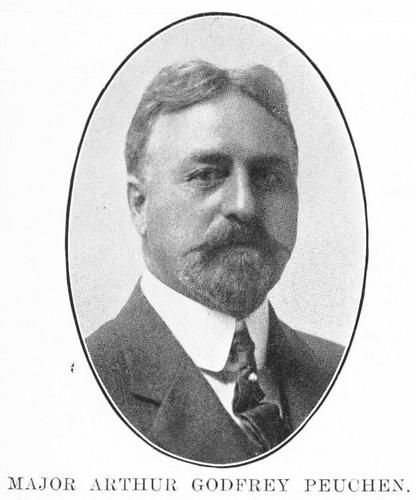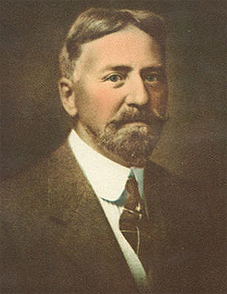Major Arthur Godfrey Peuchen
First Class Passenger

“It was stated that the first officer shot himself. As the last boat left, I am told that the people began to jump in on to the women. One of the officers is said to have drawn his revolver and shot a man thru the 'aw.”
Major Arthur Godfrey Peuchen, 52, who lived in Toronto, Canada, boarded the Titanic at Southampton as a first class passenger. He was later rescued in lifeboat no.6 after famously volunteering to join the occupants when there was a shortage of crew. Stepping forward and calling himself a yachtsmen, he proved to Second Officer Lightoller his abilities by swinging down the ropes to the lifeboat that was already being lowered. Fearing criticism for surviving the disaster he took the precaution of getting Lightoller to sigh a document testifying to it:
"Major Peuchen has a letter on a scrap of paper, given voluntarily, and signed by the Titanic's second officer, which reads as follows: 'Major Arthur Peuchen was ordered into the boat by me, owing to the fact that I required a seamen, which he proved himself to be, as well as a brave man. D. C. H. Lyntollie [sic], Second officer, late SS. Titanic.""(The Toronto World, Saturday, 20 April 1912)
Peuchen was publically very critical of the crew, beginning with Quartermaster Hichens in command of lifeboat six. Major Peuchen, in a Saturday 20 April 1912 edition of The Toronto World said: "Our sailor in charge had also got at some brandy and was incapable. So we had no provisions." Hichens later defended the accusations during the Senate Inquiry
Peuchen also went on to be most critical of Captain Smith, particularly in the Saturday, 20 April 1912 edition of The Toronto World in which he described the tragedy as being due to "criminal carelessness":
"Had Capt. Smith been on the bridge, I am confident that the horrible accident would have been averted...The captain was at dinner with Bruce Ismay and a number of millionaires for more than three hours that night. Instead of being on the bridge, where he belonged, knowing that we were going into the fields. Not a single extra was posted, and the speed was never reduced a particle. We were running very fast when we struck...I was delighted with the ship and it's magnificence, but disappointed to find Captain Smith in command. I didn't like his record with the Olympic and said so. Then we had that accident an hour after leaving Southampton. That bothered me...IF WE HAD HAD THE CAPTAIN OF OUR BOAT, THE CARPATHIA, THE ACCIDENT WOULD NEVER HAVE HAPPENED."

So harsh was his criticism that the Edmonton Daily Bulletin of Monday 29th April 1912 reported that "Major Peuchen will not receive promotion to Colonel, for which he was slated, because of his violent and absolutely unjustifiable charge made against Captain Smith of the Titanic." However, at the U.S. Senate Inquiry he did not focus on Smith but instead criticised the crew : "I imagine this crew is what we would call in yachting terms as scratch crew, brought from different vessels. They might be the best, but they were not accustomed to working together."
There are two key references to the "first officer" which considering that Peuchen was familiar with Lightoller means that he was very likely refering to Murdoch, or possibly Wilde:
"On the top deck, as I mounted, all the boats were swung out ready for action. Just at the moment a mob of stokers swarmed up to the decks. The first officer, a big burly fellow, drove them back... It was stated that the first officer shot himself. As the last boat left, I am told that the people began to jump in on to the women. One of the officers is said to have drawn his revolver and shot a man thru the 'aw" (The Toronto World, Saturday, 20 April 1912)
Peuchen does not state that he himself saw the suicide or shooting. But it is interesting that he mentions a man being shot through the jaw; his is not the only account of this happening. He is sharing a lifeboat (no.6) with Hichens who also later reported a suicide. He also seemed to have a conversation with Frederick Fleet, also in lifeboat no.6:
"The man who rowed next to me in the lifeboat was the man on the crow's nest when the vessel struck. He said he had rung three bells on first seeing the iceberg, but had received no answer from the bridge."
This "no reply" conversation was also reported during his testimony at the Senate Inquiry.
On his return to Toronto, Canada, Peuchens was apparently "maligned as a coward, partly because he appeared to be too self satisfied." . This seems to be based on a Toronto Mail account which suspected his motives "He put himself in the position of a man who had to defend himself before the necessity for the defence was apparent." One taunt about him that circulated was: "He said he was a yachtsman so he could get off the Titanic, and if there had been a fire, he would have said he was a fireman."" (8.)
Peuchen does seem to be very biased in his approach and as he was not a direct eyewitness his testimony, while possibly true, does need to be seen in context.
Verdict: